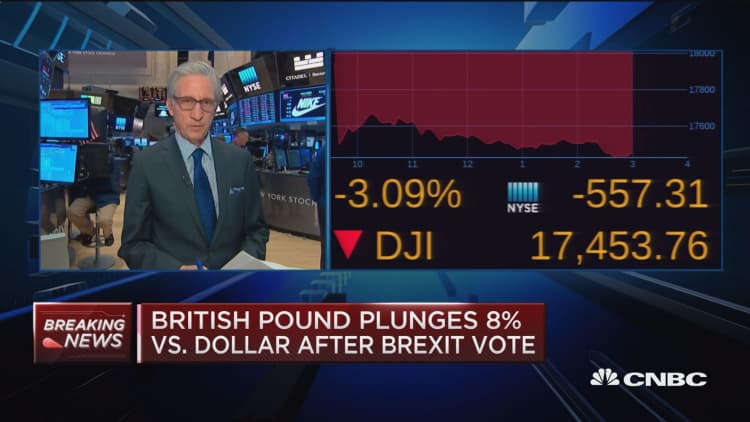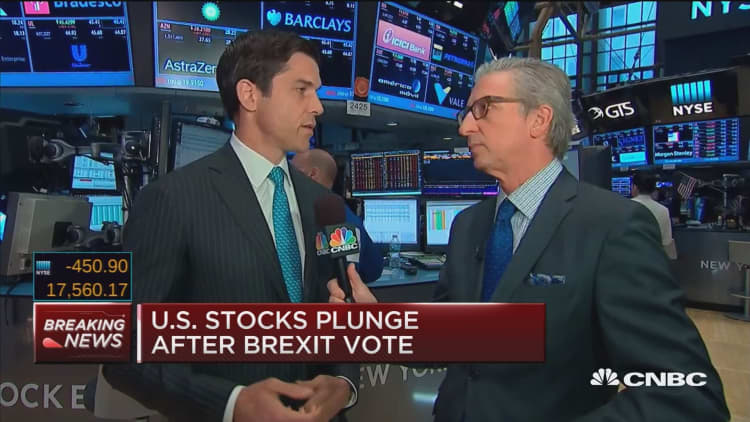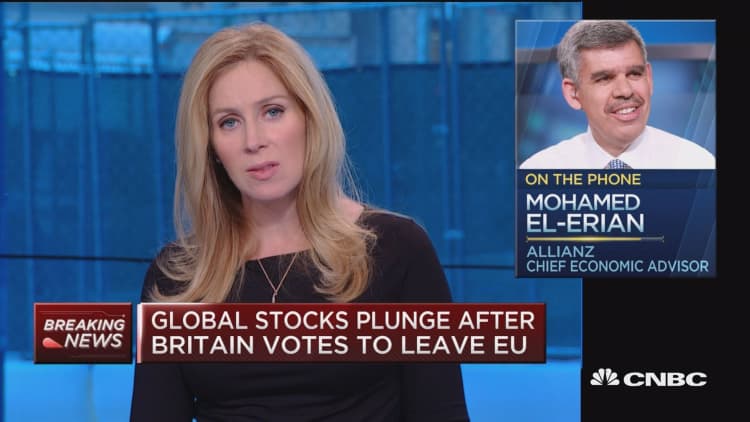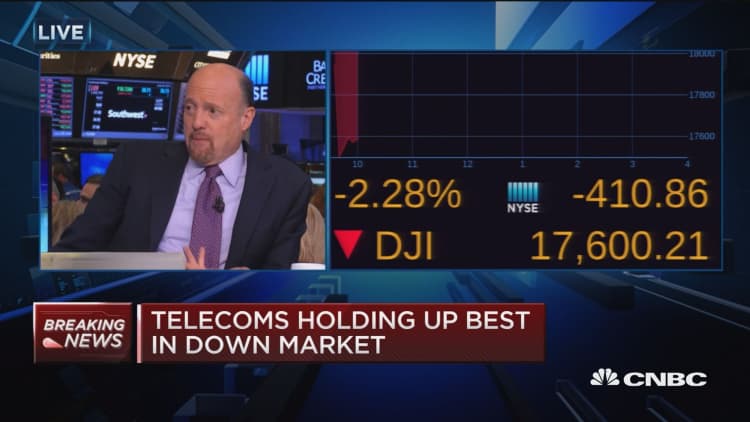





U.S. stocks plunged more than 3 percent Friday to end in the red for the year so far after Britain surprised markets by voting to leave the European Union.
"It's a combination of at first positioning, plus the reality that this issue is not the most simple to address and something you don't have precedent for," said Lefteris Farmakis, a macro strategist at UBS.
The Dow Jones industrial average closed down 610 points — its eighth-largest point loss ever — with Goldman Sachs contributing the most to declines. On a percentage basis the Dow and S&P had their worst day since August 2015, while the Nasdaq composite's 4.1 percent decline was the index's worst since August 2011.
With Friday's drop, both the Dow and S&P erased their gains for the year so far. The Nasdaq composite was nearly 6 percent lower year-to-date.
Financials dropped 5.4 percent in their worst day since August 2011 to lead nine S&P 500 sectors lower.
Investors took a defensive stance with utilities eking out a gain as the only advancing S&P sector. Trade volume was the highest of the year so far, ahead of the Russell index rebalancing scheduled for after the close.
U.S. crude oil futures settled down $2.47, or 4.93 percent, at $47.64 a barrel.
Pound sterling fell more than 10 percent against the U.S. dollar between its high of $1.500 touched late Thursday to the overnight low of $1.3224, its lowest since 1985. Sterling was last near $1.366.
"The biggest thing is markets are operating and there isn't a liquidity crisis. This isn't a Lehman moment," said Chris Gaffney, president, EverBank World Markets.
"I think investors mispriced the risk and quickly repriced it," he said. "That's what we're seeing now, the repricing of risk with heightened uncertainty."
U.S. stocks surged into the close Thursday amid increasing expectations that Britain would vote to stay in the European Union. As of the close Thursday, the major U.S. stock indexes were tracking for weekly gains of nearly 2 percent or more.
Stocks erased those gains intraday Friday to end the week more than 1.5 percent lower.
The EU referendum vote results released overnight showed the leave camp secured 51.9 percent versus 48.1 percent for remain.
"Positioning, hedging for this kind of event was super light. ... When markets realized that (leave was ahead), it's when everything started trading very badly. That was a function of very light positioning," said Andres Jaime, global FX and rates strategist at Barclays.
After the unexpected result, David Cameron announced his resignation as Prime Minister of the United Kingdom.
Global stocks plunged, with the Nikkei 225 falling nearly 8 percent. The German DAX closed down 6.8 percent for its worst day since November 2008.
"Now we have to worry about geopolitics because these events are going to be repeated. This comes against a backdrop of a very weak global economy," said Lee Ferridge, head of macro strategy, North America, at State Street Global Markets.
The STOXX Europe 600 Banks index had its worst day on record (going back to 1987) with a decline of more than 14 percent, to end more than 40 percent below its 52-week intraday high. The index lost 6.15 percent for the week, its worst since early May.
The UK FTSE 100 closed nearly 3.2 percent lower Friday for its worst day since January but held weekly gains of about 2 percent.
"I think time will tell whether it's an overreaction," said Chris Konstantinos, director of international portfolio management at Riverfront Investment. "The severity with which they're reacting suggests there's lots of uncertainty. People are analyzing the referendum as prospects for populous movements in the future."
Major U.S. Indexes
Treasury yields fell sharply. 10-year U.S. Treasury note yields hit a low of 1.406 percent, its lowest since July 26, 2012. The yield recovered to near 1.57 percent in afternoon trade.
The was last near 0.64 percent after earlier hitting a low of 0.499 percent, its lowest level since April 17, 2015.
The German 10-year bund yield fell back into negative territory.
In U.S. economic news, durable goods orders fell a more than expected 2.2 percent in May. The University of Michigan June consumer sentiment was 93.5.
The S&P 500 opened 1.88 percent lower in 1986, according to Howard Silverblatt of S&P Dow Jones Indices.
The Dow Jones industrial average closed 610.32 points lower, or 3.39 percent, to 17,400.75, with Goldman Sachs leading all constituents lower.
The closed down 76.02 points, or 3.60 percent, at 2,037.30, with financials leading nine sectors lower and utilities the only gainer.
The Nasdaq composite closed down 202.06 points, or 4.12 percent, at 4,707.98.
The CBOE Volatility Index (VIX), widely considered the best gauge of fear in the market, briefly topped 26 to its highest since mid-February before holding near 23.5.
About five stocks declined for every advancer on the New York Stock Exchange, with an exchange volume of nearly 2.5 billion and a composite volume of about 7.2 billion in the close.
Gold futures for August delivery settled up $59.30 at $1,322.40 an ounce.
This story has been updated to reflect late-day trades on the FTSE 100.


